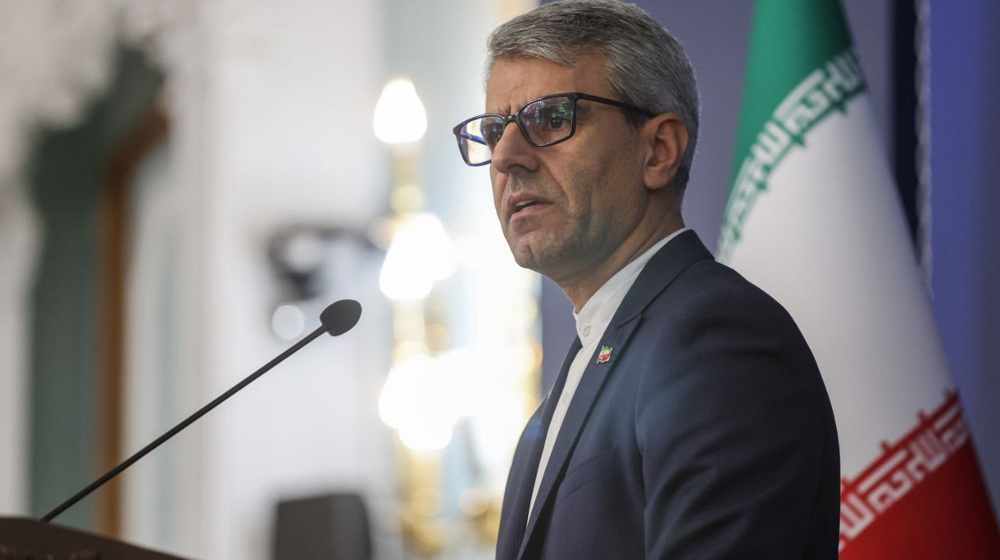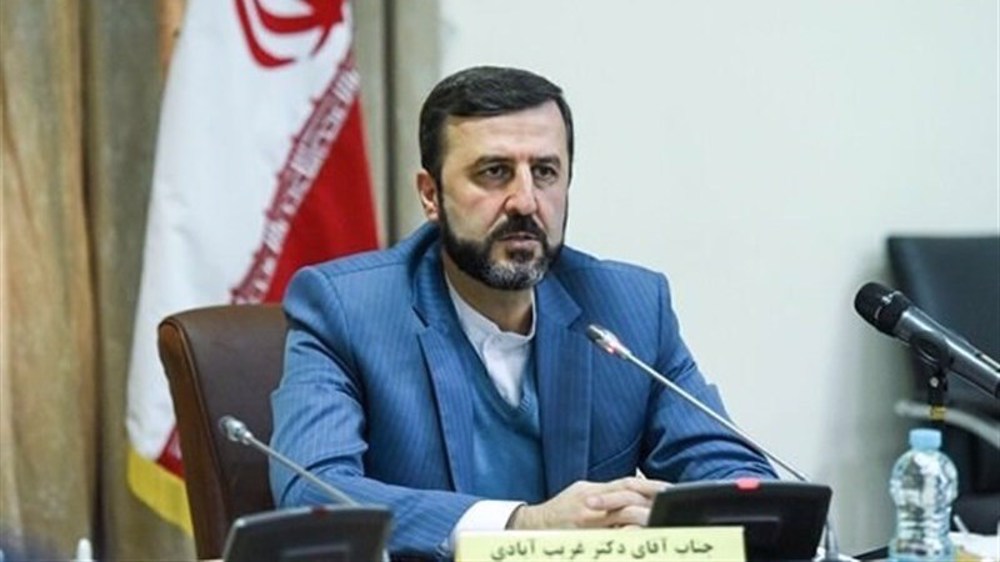Can US be trusted anymore amid talks of Iran nuclear deal scrapping?
As a growing number of indications suggest that US President Donald Trump is unlikely to certify Iran’s nuclear deal with world powers, the international community, particularly Washington’s Western allies, faces the question of whether the US can be trusted in any future international deal.
The US Republican president faces an October 15 deadline for certifying that Iran is complying with the deal. Such certification is needed by US law every 90 days in order for Congress to continue to withhold nuclear-related sanctions against Iran, itself a US commitment under the 2015 nuclear deal, known as the Joint Comprehensive Plan of Action (JCPOA).
The Trump administration has twice so far certified Iran’s compliance with the deal, but reports say he will most likely refuse to do that for a third time, leaving the Republican-controlled Congress to decide in 60 days whether to re-impose anti-Iran sanctions waived under the deal. That would let Congress effectively decide whether to kill the deal.
While the International Atomic Energy Agency (IAEA) has on multiple occasions confirmed Iran’s compliance with its commitments under the nuclear deal, the Trump administration itself has not been able to point to a single area in which Iran is in breach of the terms of the agreement.
US rift with allies over Iran
Trump’s likely decision not to certify the JCPOA comes in defiance of fierce opposition from the other parties to the deal, including the UK, Germany, France, Russia and China.
Political observers have warned that any unilateral action by the United States based on unsupported claims of Iranian non-compliance would isolate Washington, impede future efforts for other nonproliferation agreements in the broader international community and increase the likelihood of a wider conflict in the Middle East.
Reports from Washington suggest that Trump will decertify the deal, overruling his own national security team, but quietly encourage Congress not to re-impose sanctions against Iran.
Political observers say even if Congress decides to re-impose the sanctions, a dispute resolution process provides another month before the US makes it clear that it is no longer a party to an agreement accepted by its key allies, the rest of the UN Security Council and Iran.
The International Crisis Group has warned that any US decision to unravel the JCPOA would have “unfathomable” consequences for the Middle East, noting, “To imagine a stronger pact can be built on its ruins is a chimera, as destroying it - even if gradually - would also destroy the hint of trust that led the parties to compromise.”
Lobbying with Congress
After the leaders of the European signatories to the JCPOA -- the UK, France and Germany -- could not convince Trump of the dangers of killing Iran’s nuclear deal during their one-on-one sessions with the US president at the UN General Assembly in mid-September, the countries are now focusing their lobbying efforts on the US Congress.
EU Ambassador to the US David O’Sullivan and his French, German, and British counterparts met with congressional lawmakers this week to explain why Europe believes Iran’s nuclear deal is working.
O’Sullivan noted that Trump’s possible refusal to certify the deal will just pass the issue to Congress, and expressed confidence that Washington will not walk away from the JCPOA.
The top European diplomat reaffirmed the 28-member EU’s commitment to the nuclear deal, noting that as long as the bloc unanimously agrees Iran is fully respecting its obligations, the deal must stay in place.
O’Sullivan noted the way Washington proceeds on the JCPOA this time would have implications for the credibility of US behavior in other situations of multilateral diplomacy.
Since the prospect of an imminent re-imposition of anti-Iran sanctions poses threats against the European firms doing business with Iran, the EU considers reversing to a 1990s-era law that protects European companies from American extraterritorial sanctions.
In a sign of further rift with the US, the EU has sided with Iran in asserting that the deal is non-negotiable, defying Washington’s calls for renegotiating the terms of the JCPOA.
According to Pierre Vimont, a former senior European diplomat and French ambassador to Washington, there is the question of American credibility and reliability, noting that traditional US allies like Egypt, Turkey and Saudi Arabia are exploring stronger relations with Russia, which is seen as “more predictable, more serious and more rational” now than Washington.
German ambassador to the US Peter Wittig has also strongly opposed Trump’s stance on the Iran deal, saying, “It would send a signal that diplomacy is not reliable, that you cannot trust diplomatic agreements, and that would affect, I believe, our credibility in the West when we are not honoring an agreement that Iran has not violated.”
US history of quitting international pacts
This is not the first time that the international community witnesses US efforts to renege on a multilateral agreement.
In June, Trump announced that he would pull the United States out of the 2015 global agreement to fight climate change, characterizing the decision as "a reassertion of American sovereignty."
The move, which fulfills a campaign promise made just over a year ago, has drawn rebuke from Democrats at home and world leaders who had pressed Trump not to abandon the 197-nation accord.
The businessman-turned-politician has labeled climate change a hoax, defying widening international support for the Paris agreement to cut greenhouse gas emissions. He has argued that the concept of global warming has been “created by and for the Chinese in order to make US manufacturing non-competitive.”
Just a few days after his inauguration as president in January, Trump signed another executive order to withdraw his country from the negotiating process of a sweeping Pacific trade deal, the Trans Pacific Partnership (TPP), sending shockwaves in Asian capitals that had pinned their economic hopes on the deal.
The 12-country agreement was set to lower trade barriers in a region that accounts for two-fifths of the global economy.
The billionaire businessman, however, argued that free trade agreements like the TPP were lopsided against the US and harmful to American workers and manufacturing.
Trump also rattled many European leaders in May after he failed to explicitly affirm US commitment to the Article 5 of the North Atlantic Treaty Organization Article (NATO) charter, which stipulates that NATO allies must aid a fellow member under attack.
The president said NATO allies should pay the United States to defend them and even suggested that many were in arrears and owed the US past dues.
The US decisions to abandon multilateral agreements is not limited to the Trump administration. In 2002, the administration of former US President George W. Bush withdrew from the Antiballistic Missile Treaty (ABM), which it had signed with the Soviet Union in 1972.
The ABM Treaty prohibited both superpowers from deploying national defenses against long-range ballistic missiles and from building the foundation for such a defense. Russia slammed the decision as an “erroneous” move, which would alter the nature of the international strategic balance and trigger an arms race among some of the world countries.
Apart from scrapping its existing international accords, the US is becoming more reluctant to join other international pacts aimed at promoting global security.
On Friday, the State Department said that the US has no intention of signing the Treaty on the Prohibition of Nuclear Weapons adopted by 122 countries at the UN in July.
VIDEO | South Koreans demand end to joint US military drills and provocative policy against North Korea
VIDEO | A silent grief: Palestinian man struggles to recover remains of wife, children
Hind Rajab Foundation files complaint against Israeli genocidal propagandist in US
VIDEO | Trump fighting allies on Greenland
Iran FM: Selective respect for deals now haunting Europe
Arab rights group urges UK to sanction Netanyahu over 'incitement to genocide' in Gaza
‘Political, non-constructive’: Iran slams UNHRC special session on recent riots
Forced evacuations in South Gaza as Israeli military expands control over land















 This makes it easy to access the Press TV website
This makes it easy to access the Press TV website